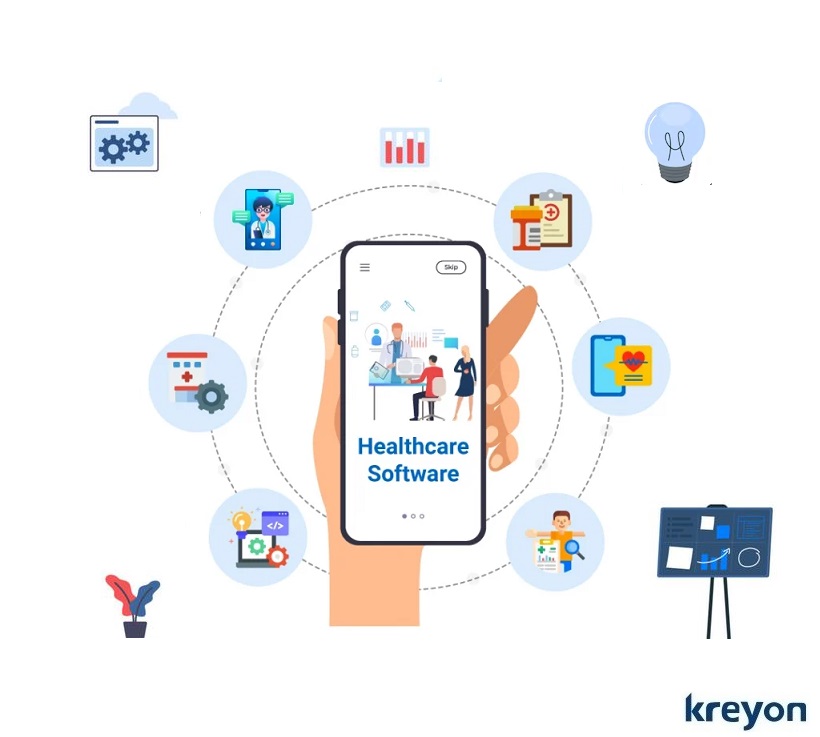Digital Transformation in Healthcare: Improving Patient Care and Outcomes
 Digital transformation in healthcare is revolutionizing the industry by improving patient care and outcomes using innovative technologies. With the rise of telemedicine, wearable devices, and electronic health records (EHRs), patients can now receive personalized care from the comfort of their homes. This has also resulted in improved data collection and analysis, leading to better-informed decisions by healthcare providers using AI.
Digital transformation in healthcare is revolutionizing the industry by improving patient care and outcomes using innovative technologies. With the rise of telemedicine, wearable devices, and electronic health records (EHRs), patients can now receive personalized care from the comfort of their homes. This has also resulted in improved data collection and analysis, leading to better-informed decisions by healthcare providers using AI.
Digital transformation has also made it easier for patients to access medical information & communicate with their doctors, leading to more efficient and effective care. In this era of technological advancements, digital transformation is not just an option but a necessity for healthcare providers who want to stay ahead of the curve and provide the best possible care to their patients.
Is Digital Transformation in Healthcare Necessary?

Digital transformation in healthcare is a powerful force that is changing the way healthcare services are delivered. It has brought about a significant shift in the industry, enabling healthcare providers to improve patient outcomes, streamline workflows, and optimize costs. The benefits of digital transformation in healthcare are numerous and far-reaching.
One of the main advantages of digital transformation in healthcare is the ability to improve patient outcomes tangibly. Digital technologies enable healthcare providers to gather and analyze patient data in real-time, which can help identify potential health risks earlier and enable healthcare providers to intervene before these risks become serious. This can lead to better health outcomes for patients, reduced healthcare costs, & improved quality of life.
Another significant benefit of digital transformation in healthcare is the ability to streamline workflows. Digital technologies can automate many of the administrative tasks that healthcare providers perform, such as patient scheduling and billing.
This can free up time for healthcare providers to spend more time with patients, improving the quality of care they receive. Additionally, digital technologies can improve communication between healthcare providers and patients, making it easier for patients to access care and communicate with their healthcare providers.
Digital transformation in healthcare can also lead to cost savings for healthcare providers. Digital technologies can help healthcare providers optimize their workflows, reduce waste, and improve efficiency.
This can lead to significant cost savings over time, which can be reinvested in improving patient care. Additionally, digital technologies can help healthcare providers identify areas where costs can be reduced, such as unnecessary tests or procedures.
With electronic health records, patients can get the best of healthcare facilities in an interconnected way. The doctors can look up patient history, diagnosis, treatment, medication etc. & act in an informed manner.
Although, data security is a concern when dealing with medical data of individuals. Healthcare software systems need to ensure data compliance and privacy standards as per regulatory needs.
Challenges of Implementing Digital Transformation in Healthcare
The healthcare industry is going through a significant transformation due to the adoption of digital technologies. However, implementing digital transformation in healthcare is not without challenges. The challenges of implementing digital transformation in healthcare are acute, and they require careful consideration & planning to overcome.
One of the major challenges of implementing digital transformation in healthcare is the complexity of the healthcare industry itself. Healthcare is a highly regulated industry, and there are strict rules and regulations that must be adhered.
In addition, healthcare data is highly sensitive, and there are strict privacy laws that must be followed. As a result, implementing digital transformation in healthcare requires a deep understanding of the industry, its regulations, and its unique challenges.
Another hurdle of implementing digital transformation in healthcare is the resistance to change. The healthcare industry has been slow to adopt digital technologies, and many healthcare providers are resistant to change.
This resistance can be due to a variety of factors, such as fear of the unknown, lack of understanding of digital technologies, inability to map desired patient outcomes by using technology, or a reluctance to change established processes.
Overcoming this requires a careful plan that involves extensive training, education, and communication with the key stakeholders. The cost of implementing digital transformation in healthcare is also a significant factor. Digital technologies can be expensive, and healthcare providers may not have the resources to invest in these technologies.
Additionally, implementing digital technologies may require significant changes to existing processes, which can be costly and time-consuming. Overcoming this challenge requires a careful cost-benefit analysis and a clear understanding of the return on investment.
Overcoming the challenges of implementing digital transformation in healthcare requires a deep understanding of the industry, extensive training and education, careful cost-benefit analysis, and effective communication.
Despite the challenges, digital transformation in healthcare is essential for improving patient outcomes, streamlining processes, and increasing efficiency.
Artificial Intelligence and Machine Learning in Digital Transformation

Digital transformation is a process of using digital technology to fundamentally change the way healthcare facilities operate, providing them with new opportunities for growth, efficiency, and innovation.
Artificial intelligence (AI) and machine learning (ML) have become increasingly important components of this transformation, driving healthcare providers to adopt new technologies that enable them to automate processes, gain insights from large amounts of data, and improve decision-making.
AI and ML are two interrelated technologies that are helping hospitals to use data for advanced insights. For e.g. using wearable devices, the system can decipher any abnormal blood, sugar levels that can lead to a disease.
AI computer systems can perform tasks that would normally require human intelligence, for e.g. image recognition to detect any diseases in patient CT scans, X-rays etc. The training algorithms on patient data is being used to detect patterns, make predictions and improve diagnostics.
Automating processes: One of the main benefits of AI and ML is that they can automate many processes, reducing the need for manual labor and enabling healthcare institutions to operate more efficiently. For example, chatbots can handle patient care inquiries and machine learning algorithms can analyze large datasets to recommend preventive healthcare tips to patients.
Personalization: AI and ML can also be used to improve the patient experience, by enabling healthcare institutions to personalize their treatments based on patient preferences and behavior. For example, AI-powered chatbots can provide personalized recommendations for diet, lifestyle, exercise etc.
AI & ML can analyze vast amounts of patient data to identify trends, predict outcomes, and develop personalized treatment plans. It can improve accuracy, reduce errors, and lead to better patient outcomes.
Improving Patient Outcomes through Digital Transformation
Digital transformation in healthcare has the potential to significantly improve patient outcomes by enhancing the efficiency, accuracy, reporting and accessibility of care.
Implement Electronic Health Records (EHRs): EHRs allow for quick and easy access to patient records, which can help improve diagnosis, treatment, and patient safety. They can also improve communication between healthcare providers and patients thereby reducing the risk of medical errors.
Use Telemedicine: Telemedicine enables remote consultations between patients and healthcare institutions, which can improve access to care, particularly for patients in remote or underserved areas. It reduces the need for in-person visits, thereby lowering costs and improving patient convenience.
Utilize Wearable Devices: Wearable devices, such as smartwatches or fitness trackers, can track patient’s vital signs and activity levels, providing healthcare providers with real-time data on their condition. This data can be crucial, in case of an emergy. This can enable early intervention and improve outcomes for patients with chronic conditions.
Enhance Patient Engagement: Digital tools, such as patient portals or healthcare apps, can help patients better manage their health by providing access to their medical records, appointment scheduling, and medication reminders. This can improve patient engagement and adherence to treatment plans, leading to better health & outcomes for patients.
Overall, digital transformation in healthcare industry has the potential to improve patient outcomes by enhancing the efficiency, accuracy, and availability of care. By embracing new technologies and leveraging data, healthcare providers can work to deliver more personalized, preventive & effective care to patients.
Kreyon Systems provides healthcare software and apps for managing healthcare centers, connecting with patients & building telehealth services. If you have any queries, please reach out to us.
